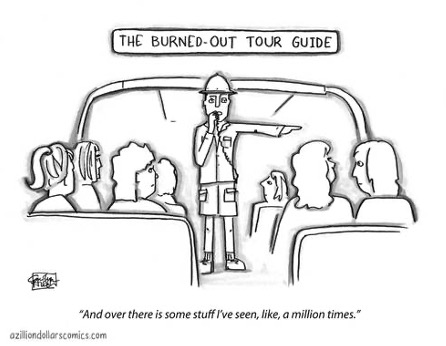Voice and Analysis in Your Essay
The Tour Guide Approach
This handout is available for download in DOCX format and PDF format.
Several people have asked me what I mean when I ask for more VOICE in your essay. This is a great question, and it gets to the heart of what analysis looks like in a research paper. The goal of a research paper is to use the literature (your research) to support your own unique argument. This is different from a literature review, which simply reviews what others have said about a topic. In a research paper, there is some literature review, typically towards the beginning, but the larger goal is to DO SOMETHING with this literature to show your own take on the topic. This is analysis and it is what gives voice to your essay. One way to think about voice is to see yourself as the TOUR GUIDE of your essay.
Imagine a tour of a city. The guide's job is to take people from place to place, showing them things that make the city special. A mediocre guide might just say, "This is Westminster Abbey," "This is Big Ben," etc. They might provide facts, such as who is buried at Westminster Abbey, but they don't put any of the information in context. You might as well do a self-guided tour. This is the equivalent of a literature review: you describe all of the studies and theories, but you don't tell the reader what to do with this new knowledge. The EVIDENCE is there, but the ANALYSIS is missing.

On the other hand, a good tour guide doesn't just show you the buildings. Instead, they tell you about how these monuments reflect the history and culture of the city. They put the buildings into context to tell a story and give you a sense of place, time, purpose, etc. This is the equivalent of a good research paper. It takes evidence (data, observations, theories) and does something with it to communicate a new angle to your reader. It argues something, using the literature as a foundation on which to build the new, original argument.
Good tour guides (writers) insert their voice often. The voice can be heard in topic sentences, where the writer tells the reader how the paragraph fits into the larger argument (i.e., how it connects to the thesis). The voice can be heard in the analysis in the paragraphs as the writer tells the reader what has been learned and what it means for the larger argument. The voice often gets stronger as the essay progresses—especially since earlier paragraphs often contain more background information and later paragraphs are more likely to contain argument built on that background information. A good tour guide also:
- Doesn't tell the reader things they already know
- Doesn't over-explain or provide unnecessary detail
- Doesn't rush— if they move too fast, their tour won't be able to keep up
- Keeps things interesting (doesn't visit boring sites!)
- Keeps things organized (no backtracking to sites they've already visited)
How to use this in your writing:
Analysis is any moment in which you tell the reader your interpretation, how ideas fit together, why something matters, etc. It is when your voice comes through, as opposed to the authors of the articles you cite.
What might analysis / tour guiding look like in a research essay?
- Critique of the literature (methodological flaws, different interpretations of findings, etc.)
- Resolution of contradictory evidence
- Analysis of differing theories (in light of the evidence)
- Incorporation of various lenses, e.g., cultural or societal influences, cross-cultural similarities or differences, etc.
- Historical changes
- Fusion of literature or topics that are not obviously related
- Transitional language that connects pieces of the argument
Credit: Elissa Jacobs, University Writing Program